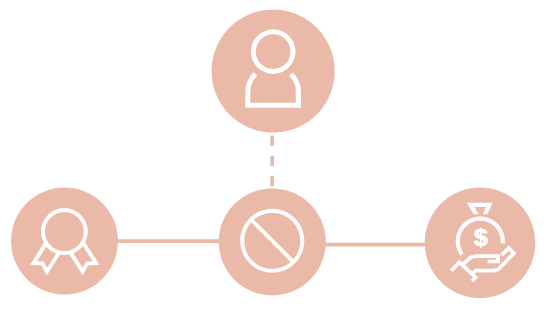
An official must not improperly use power conferred through their positions to gain, or seek to gain, a benefit or an advantage for themselves or for another person, or cause, or seek to cause, detriment to the Commonwealth entity that employs them, to the Commonwealth more broadly or to any other person (section 27 of the PGPA Act).
An official contravenes this duty when they engage in conduct with the intention of obtaining an advantage or causing detriment, regardless of whether the benefit or detriment actually occurs.
Misusing a position can include using the entity's property or information or taking advantage of opportunities that arise by virtue of the official's employment with the entity. These are advantages that an outside person would not have access to. Misuse of a position may also involve a breach of the duty of care and diligence and the duty to act in good faith and for a proper purpose.
Position includes:
- a permanent or temporary work assignment,
- the powers or functions that have been delegated to an official, or the duties an official has been properly authorised to undertake on behalf of another official, or
- the general status that is associated with being an official.
Advantage has a wide meaning and includes both financial and non-financial advantages, such as providing favourable treatment to a person during a procurement tender or recruitment process.
Detriment also has a wide meaning covering detriment caused by an official misuse their position either positively or negatively.
Examples of misuse of position could be:
- an official using their official title to seek a discount that benefits them personally
- on behalf of the entity, entering into a contract for the provision of goods or services with a family member or friend, without disclosing the potential material personal interest
- using Commonwealth resources for personal purposes without clear approval.
Case study
Anna is the finance manager of a Commonwealth entity that is about to tender to engage an accounting firm to assist with an internal audit. While in Melbourne, she had a coffee meeting with Greg, a potential tender applicant. Anna insisted on paying for the coffees. When they are walking back to their cars after coffee, it starts to rain. Greg's car is not far away and Anna's car is three blocks down the road. Greg offers Anna his umbrella, which has his accounting firm branded on it and says that she may as well keep it as he has about 20 of them back at the office.
Appropriate action: While Anna would love to accept the umbrella and stay dry, she is concerned that by receiving and using the umbrella it might be perceived within her entity and externally that she has been favourably influenced by the tender applicant. There are a number of possible actions available to Anna. These include:
- Anna accepts the loan of the umbrella, but returns it promptly or
- Anna considers the risks associated with accepting the gift and instead suggests that they walk to Greg's car and he give her a lift to her car.
For APS employees, the APS Code of Conduct requires the employee not to 'make improper use of inside information, or the employee's duties, status, power or authority in order to gain, to seek to gain, a benefit or advantage for the employee or for any other person or cause, or seek to cause a detriment to the agency, the Commonwealth, or any other person' (section 13(10)(b) of the Public Service Act 1999).
Explore your other duties

